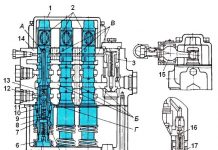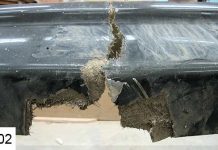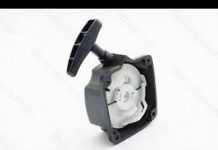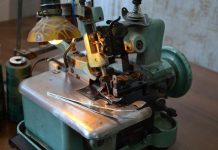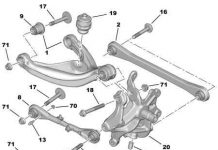In detail: do-it-yourself gazelle Cummins checkpoint repair from a real master for the site my.housecope.com.
We remove the gearbox. We look at the article - "Removing and installing the checkpoint."
We wrap the filler and drain plugs in place.
Remove the power unit support.
Remove the reversing light switch.
We remove the speedometer drive.
We remove the clutch with the bearing and the foam rubber rings of the front cover.
Using a 12 key, unscrew the three bolts securing the bearing cover (the bolts are installed on the sealant).
Remove the cover with the gasket.
When installing it later, pay attention to the coincidence of the oil drainage channel in the cover and the holes in the crankcase.
Prying off with a screwdriver, remove the input shaft seal from the cover (when disassembling the gearbox, we replace all the cuffs, regardless of their condition).
Press in a new cuff with a mandrel or a head of a suitable diameter.
With the key "13" we unscrew and remove the bolt securing the bushing of the reverse gear axle to the front crankcase
Use a thin screwdriver to pry on and remove the retaining ring of the input shaft bearing
Turn the key "12" and remove the breather.
Using a 12 key, unscrew ten bolts connecting the front and rear crankcases (two bolts passing through the dowel sleeves are longer than the others).
11. Gently tapping with a hammer through the brass mandrel, undo the front and rear crankcases.
In this case, do not strike at the end of the input shaft, as the synchronizers will be damaged.
Disconnect the gearbox housings
Carefully, trying not to damage, remove the gasket
We take out the adjusting shims from the bore under the intermediate shaft bearing in the front crankcase (they may not be there). In this case, the axial clearance in the bearings is set only by the crankcase seal.
| Video (click to play). |
through the twisted reverse sensor
In order not to climb under the car for topping up, I pour it through the hole with the mixer removed (business 3-4 minutes)
- Like
- I do not like
I drove 110,000, there was a crack in the fifth from the first kilometers, the dealer said - get used to it, this is not a foreign car, after 40,000 you will come to our bulkhead. After such words, I began to use it carefully, but unknowingly, the engine did not turn. on the contrary, he switched it on smoothly and in a light tightness. And then it came, the clutch, by the way, has not changed either. In principle, it does not make much noise, but it works louder than before, but the 3rd speed does not periodically turn on, it pops up when turned on (after overglowing it turns on) and so every few days, and the back one turns off constantly ((Can you tell me what is supposedly worn out? And good conscientious master in St. Petersburg
- Like
- I do not like


And I forgot to write, when you turn on the gears, there is a feeling that the lever reaches the end and seems to move back a little, maybe everything is easier for me, something from the gear engagement mechanisms, can this be somehow determined without removing the gearbox?
- Like
- I do not like
It's the same story. all speeds work fine, but the crackle on the 5th is just tinny, especially when you release the gas, dismantled the korobas, the case turned out to be in the bearing of the secondary shaft, on the inside there are a lot of shells, as if the rust had eaten (the question is where), when you turn the bearing it gets stuck for him and crackle. better to change immediately 2.
- Like
- I do not like
- Like
- I do not like
Hello to all. Tell me about the box Gazelle Cummins, I have already disassembled and repaired three times, changed bearings and gears. 3000-5000 mileage after repair and again noise at 3 and 5 speeds, again primary and secondary bearings. What is the problem with the bearings, or what.
- Like
- I do not like
Hello to all. Tell me about the box Gazelle Cummins, I have already disassembled and repaired three times, changed bearings and gears. 3000-5000 mileage after repair and again noise at 3 and 5 speeds, again primary and secondary bearings. What is the problem with the bearings, or what.
the box loves speed, if you “feel sorry” for it, so it falls apart. Acceleration without phonatism
- Like
- I do not like
in other matters, like dviglo, does not like tightness.
- Like
- I do not like
Hello to all. Tell me about the box Gazelle Cummins, I have already disassembled and repaired three times, changed bearings and gears. 3000-5000 mileage after repair and again noise at 3 and 5 speeds, again primary and secondary bearings. What is the problem with the bearings, or what.
Even for a diesel engine there are very few, there are many reasons, starting from the universal joint and ending with the banal, the gearbox was poorly washed during assembly.
- Like
- I do not like
Even for a diesel engine there are very few, there are many reasons, starting from the universal joint and ending with the banal, the gearbox was poorly washed during assembly.
What bearings do you put, the price? after the bulkhead, I fill in the oil with 100 km, I drove the drain, then 2 thousand. can be changed again. The rubber "cap" on the lever is mandatory.
Put the import, they run 80-100 tons and oil 2.5 liters
- Like
- I do not like
avc wrote on the forum today that they think to put zf as an option. Wait. I don't like the checkpoint either.
- Like
- I do not like
What bearings do you put, the price? after the bulkhead, I fill in the oil with 100 km, I drove the drain, then 2 thousand. can be changed again. The rubber "cap" on the lever is mandatory.
Stood nachi recently put on the primary koyu on the secondary phage price 750-1000 for one
- Like
- I do not like

Even for a diesel engine there are very few, there are many reasons, starting from the universal joint and ending with the banal, the gearbox was poorly washed during assembly.
What, exactly, is the import? Name, labeling is there?
- Like
- I do not like
What, exactly, is the import? Name, labeling is there?
(30BC07S1NR) NACHI. (511242B) FAG. NACHI is 1mm wider, you need to grind a support washer, this is a secondary, and the primary 6307NR manufacturer is at your discretion.
- Like
- I do not like

Hello everyone. Has anyone already disassembled the box on the Neks? And then I recently bought a gearbox with Nekst markings, 3302-. 60. And she has a Volgovskiy speedometer drive. Does it really have to be?
- Like
- I do not like
Hello everyone. Has anyone already disassembled the box on the Neks? And then I recently bought a gearbox with Nekst markings, 3302-. 60. And she has a Volgovskiy speedometer drive. Does it really have to be?
- Like
- I do not like
AVEKA, in the same place 1.2 l passport capacity. Where to pour that 2 liters? But what about the oil seals?
Has there been a new infa on ZF? And then I have zf6s400
Post has been editedAlpinist: 11 July 2014 - 13:56
- Like
- I do not like

Hello Forum! Guys, what a roar on the hot on H.H. in a checkpoint or in a traction? On the move there is perfect silence, in winter it also does not thunder. When the traction is squeezed out, it disappears. I noticed at 13,000, now 36,000. Only in the heat, (after the highway), and about every third diesel engine (my observations ). SPS in advance.
- Like
- I do not like

Mileage 190,000, did not make a box. I changed the factory oil for 100,000 thousand, poured castrol, the gears were switched on easily, but the noise increased. Leaked, poured BP, it seems to have become quieter. Recently the noise has increased. I thought to sort out the box. How did I go to a car oil store, look at imported oil again to fill it up better? The seller asks how to help? I'm talking with the choice of oil in a gazelle box. He immediately takes out the oil
Filled, silence in the cabin, although it's hot outside, of course I don't know how for the winter, but I'm happy with the oil, the gears are switched as I remember on the new car, the synchronizers work well with it. And most importantly, the price is 4L. I bought an imported one for the same money 1 liter. And with these sanctions, will imported oil live long))) I will support the domestic manufacturer, as I once bought a gazelle and not a foreign car))) Of course, everyone has his own choice!
By the way, I bought another one and changed it in the bridge!
Post has been editedLuidor-man: 02 August 2014 - 12:06
Noise in the gearbox is usually the result of bearing wear, chipping of the working surface of the gear teeth, and even their breakage. Disassembly of the gearbox and replacement of damaged parts is required.
Another reason even a new gearbox can make noise is the low oil level in the crankcase. This malfunction is a consequence of an oil leak from the gearbox.
A misalignment of the crankshaft and clutch housing is also possible. Using an indicator mounted on a stand attached to the rear end of the engine crankshaft (gearbox and clutch removed), while rotating the shaft, check the runout of the bore for the gearbox in the clutch housing (db 0.3 max) and the non-perpendicularity of the rear end clutch housing (d. b. 0.15 max).
How to remove the gearbox can be read in many printed and electronic publications, such as the repair and maintenance manual, so this operation will not be described in this article.
The next step is to thoroughly wash and rinse all parts of the gearbox, including the crankcase of the gearbox itself. Next, conduct a close inspection of all gearbox parts for damage and excessive wear.
- chipping of the working surface of the inner ring of the input shaft bearing (for clarity, the bearing is cut)
- slight wear of the secondary shaft roller bearing,
- output shaft bearing play,
- play in the bearing of the toe of the input shaft of the gearbox (pressed into the crankshaft),
- the absence of one of the contacts of the reverse sensor (broke off when dismantling the gearbox)
- input shaft bearing V6-50307АКШ1,
- secondary shaft roller bearing 20-1701182,
- bearing of the secondary shaft V6-50706USH1,
- primary toe bearing 402.1701031,
- reverse gear sensor LSH.609.016,
- gearbox shank oil seal (2 pcs.) 24-1701210-07,
- set of paronite gaskets.
I will not describe the assembly itself either, but I will point out its subtleties.
For ease of assembly, it is better to screw the rear part of the gearbox housing with self-tapping screws to the bar (see below in the photo). In this state, it is easier to insert the shafts, the crankcase does not fall anywhere and does not collapse.
For this, a similar block is taken as for the rear of the crankcase and a hole is drilled with an 18 mm feather drill, then the output shaft is inserted into the drilled hole (see photo). Now the work on pressing will be much easier, and will not spoil the shaft itself when it stops.
In the same block, next to the previously drilled hole, a new hole is drilled with a 16 mm nib drill. Then the input shaft is inserted into the drilled hole (see photo) and 14 rollers are installed. Without removing the shaft from the bar, we connect the primary and secondary shafts. Now this node is ready for further assembly.
The resulting device in the course of work.
We install the primary, secondary and intermediate shafts in the gearbox housing. If the plunger jumped out during the parsing of the checkpoint, then questions may arise: how did they still stand? Schematically it looks like this:
If all the parts located inside the crankcase are installed, then you can connect the two halves of the gearbox housing and tighten 10 bolts.
It remains to install the gear lever and check the engagement of each of the gears, scrolling the input shaft, controlling the speed and direction of rotation of the output shaft. We unscrew the block previously screwed to the rear half of the gearbox housing. Screw in the reverse sensor after installing the gearbox on the vehicle.
Lubricate with paste (included in the kit with the ZMZ clutch disc): the seat on the input shaft for the crankshaft bearing, the input shaft splines and the sliding surface of the release bearing of the gearbox front cover.
... installation of the reverse sensor in the gearbox.
The oil should still be poured through the hole for the gear lever, because in this case, it will partially lubricate the gearbox elements, and conduct additional control through the filler hole.
Hang up the rear wheels of the car (jack up and place the rear axle of the car on the stops), start the engine and slowly turn on the gears one by one (create an imitation of the car's movement). Performance test of each transmission for about one minute. WHAT WILL IT GIVE!? Firstly, since the gearbox parts have been thoroughly washed, then the initial operation of the gearbox will be dry, despite the fact that the oil is already filled in As a result, the operation of the primary and secondary shafts goes dry, although where the gears and bearings were lubricated during the assembly process), and when the vehicle is operating without load, it will painlessly distribute the oil inside the gearbox system, and secondly, in case of unforeseen circumstances (sudden exit failure of any element, breakdown, etc.) the operation of components and assemblies will be without load, which will avoid more serious breakdowns.
- Features of the repair of the gearbox "Gazelle"
- Features of Gazelle gearbox repair
- How the gearbox is arranged on the Gazelle
- When a gearbox repair is needed
- The main malfunctions of the gearbox on GAZ 3307 cars
- How to repair a Gazelle checkpoint
- Essential tool for removing and disassembling the box
- Step-by-step instructions on how to remove the box
- Disassembly and assembly of the Gazelle gearbox
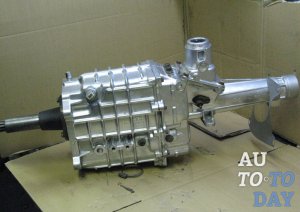
The Gazelle checkpoint is reliable and durable. But constant loads sometimes lead to its breakdown. Repair of the Gazelle gearbox will require from the driver:
- knowledge of the materiel of the car;
- the ability to remove the checkpoint, disassemble, and then assemble and put in place;
- strict adherence to safety regulations;
- attention, accuracy and patience.
Transmission - mechanical, five-speed. Consists of:
- two aluminum crankcases (connected with 10 bolts);
- primary and secondary shafts (connected to the crankshaft and cardan);
- an intermediate shaft with cut teeth of the 1st gear and reverse gear, a pressed gear block and a speedometer drive gear;
- inertial synchronizers;
- spring balls for gear fixing;
- blocking the inclusion of gears at the same time;
- a damper lever device;
The signal for urgent repair of the Gazelle gearbox is:
- Inability to change gear or if it is difficult to do so.
- When you try to turn on the gear while driving, a loud crack is heard.
- Self-inclusion of the transfer (threatens the danger of an accident).
- Any extraneous noise, crunching, tapping at the checkpoint.
- Scheduled diagnostics of the Gazelle checkpoint should be carried out every 300,000 km.
Long-term operation of Gazelle cars made it possible to make a list of the main faults of the Gazelle gearbox and their possible reasons:
- Cause of humming noise during operation - destruction of worn parts or loosening of fastening bolts;
- Crunch at the checkpoint - destruction of bearings;
- Crackle when switching - the synchronizer rings are worn out;
- Difficulty shifting speeds - jamming in the gearbox drive, wear of gears, burrs, etc. (you need to disassemble and look);
- Self-switching off speeds - misalignment of gear teeth, wear of rods and forks, loosening of gearbox and driven shaft fasteners;
- Oil loss - a crack in the crankcases, loosening of fasteners, wear of the gasket, oil seal, etc.
A breakdown was found, the reasons were found out - it remains to start repairing. To do this, it is necessary to remove and disassemble the checkpoint.
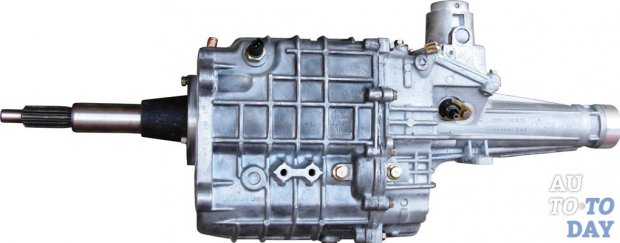
For repairs, you will need an inspection pit or overpass, as well as tools:
- a set of keys (for 10, 12, 13, 14, 17, 19);
- Screwdriver Set;
- beard;
- wooden blocks;
- pliers (pliers);
- mount;
- strippers;
- hammer;
- file, sandpaper;
- brass lining or copper hammer;
- mandrel for old oil seals.
- container for draining oil;
- rags;
- SHRUS-4, gear oil, GOI paste.
When repairing a Gazelle checkpoint with your own hands, first of all, you need to drive the car onto an overpass or inspection pit. After that, proceed to remove the box:
Step 1 - free the crankcase from oil;
Step 2 - remove the gimbal:
- using a file, mark the position of the cardan joint and the gearbox extension, as well as the cardan and rear axle flanges;
- using keys 12 and 13, remove the fasteners for the intermediate support;
- using keys 14 and 17, remove the cardan fasteners to the flange of the main gear drive gear;
- remove the shank from the gearbox (pull it back and pull it out);
- Plug the hole with a rag.
Step 3 - get the lever:
- from inside the cab, remove the cover and the upper part of the lever;
- unclench the spacer sleeve, remove the rubber pad and locking sleeve;
- remove the floor seal and the protective cover, unscrew the cover and remove the lever.
Step 4 - disconnect the speedometer and reversing light switch from the checkpoint.
Step 5 - remove the checkpoint:
- unscrew the fasteners of the intake pipes and the bracket to the gearbox (keys 12 and 14);
- disconnect the gearbox from the clutch housing (4 nuts);
- protect the block head with a wooden block;
- remove the cross member of the gearbox mounting and shaking, giving back the box itself.
Troubleshooting requires overhauling the Gazelle gearbox. Disassembly of the checkpoint must be done in stages:
- Remove the bearing cover, change the oil seal (key 12, screwdriver, mandrel).
- Remove the reversing axle bushing fasteners (spanner 13).
- Remove the input shaft bearing circlip (thin screwdriver).
- Remove breather.
- Disconnect the crankcases (12 wrench, hammer and brass mandrel).
- Engage reverse gear (by turning the input shaft).
- Remove the gear fork mount (spanner 10).
- Remove the lever bodies and the plate with the gasket (key 12).
- Remove the springs and balls (3 each) of the retainers (magnetic screwdriver).
- Remove the rods in order - 1, 2, 5, reverse, 3 and 4 gears and the locking pin.
- Using a wrench 13, unscrew the fastening of the reverse gear axle and remove the circlip of the rear bearing of the output shaft.
- Remove the shafts (using a copper hammer) and disassemble them. When disassembling, carefully lay out the parts in order, mark their relative position.
Assembling the Gazelle gearbox after repair is carried out in the reverse order. The shafts should be installed at the same time (tie with twine). Before assembly, you should carefully inspect the crankcase (for cracks, notches, bumps). Wash all parts (in kerosene, diesel fuel), inspect (bearings, shafts, gaskets, gear teeth, etc.). Any traces of corrosion, grind the faces. Replace all broken or suspicious parts with new ones, lubricate with transmission oil, SHRUS-4 (cuffs, splines, etc.). Treat the crankcase fasteners with sealant. Do-it-yourself Gazelle gearbox bearings should be replaced every 100,000 km.
Installing the gearbox The gearbox is installed in the reverse order. The slots must be lubricated with SHRUS-4. Next, a cardan is placed (you need to make sure that the marks match). After installing the gearbox, pour in 1.2 liters. oil into the crankcase (up to the filler hole). As you have seen, the work on the checkpoint repair is large and preparation for it must be serious.
We remove the gearbox as described in the article - Removing and installing the GAZelle Next gearbox
We clean the dirt and wash the outside of the gearbox.
Unscrew the reversing light switch with a gasket
Using a 10 key, unscrew the bolt securing the pressure plate of the speed sensor
Removing the restrictive plate
Turning left and right with a key 22 for the sensor
We remove the drive from the gearbox housing
We remove the clutch with the bearing and the foam rings of the front cover
Using a 12 key, unscrew the three bolts securing the bearing cover (the bolts are installed on the sealant).
Remove the cover with the gasket.
When installing it later, pay attention to the coincidence of the oil drainage channel in the cover and the holes in the crankcase.
Prying off with a screwdriver, remove the input shaft cuff from the cover (when disassembling the gearbox, we replace all the cuffs, regardless of their condition)
Press in a new cuff with a mandrel or a head of a suitable diameter
With the key "13" we unscrew and remove the bolt securing the bushing of the reverse gear axle to the front crankcase
The cost of repairing boxes:
RUB 3000, including removal and installation without spare parts.
6000 rubles, including spare parts and remove / deliver, if the entire shafts and housing.
The cost of repairs is fixed and cannot be changed.
Taking into account the removal of the box, the price of the gearbox repair on the Gazelle: RUB 3000, including removal and installation on a car.

Repair of a GAZelle box involves the following work:
free car diagnostics to accurately determine the breakdown; removal from the car;
complete disassembly of the checkpoint is mandatory;
troubleshooting of internal spare parts;
replacement of necessary (worn out) spare parts - parts;
Assembly and installation back to the car.
The cost for the repair is one and cannot change, from an internal fault.
The warranty for our work performed and spare parts is from 90 days to one year with no mileage limitation.
Our work is paid only after checking and accepting the car.
Time for gearbox repair including removal - installation takes approximately 2-3 hours.
To repair the checkpoint, we do not take Chinese ones, but install only the original GAZ spare parts.
All that is needed for the repair of oil seals, sealant, gaskets, assembled and bare shafts, housings, bearings, wings are always with us at a cost lower than in ordinary chain stores.
The service is called - checkpoint exchange gazelle... Our fund has already sorted boxes and you can use the service to save time. All gearboxes for exchange are subject to complete disassembly → overhaul → assembly. All such boxes are guaranteed for up to one year. If the average repair time is about 3 hours, then the exchange takes about 1.5 - 2 hours.

If your box is almost completely broken (shafts and housing are damaged), then the repair will be expensive and it will not be profitable for an exchange either. Then in this case you can buy used KPP-5 Art. for gazelle, Volga, sable with a guarantee up to a year... To avoid damage to the box, you should not start the gazelle from the tug at reverse speed, with a loaded car, do not abruptly drive in reverse, otherwise it threatens to break the body and two shafts. Also, watch the oil level, in the absence of oil, gears and bearings overheat, after which all iron parts must be replaced, which can be very expensive!

Another common malfunction is when the speed “knocks out” or the gearbox “does not keep” the gear. This happens due to breakage or the development of teeth on the gearshift clutch and its other part is the crown on the gear. The need to replace spare parts is determined after a detailed, thorough inspection and troubleshooting.
Other most common problems in the operation of the Gazelle, Volga and sable gearboxes are oil leaks from under the oil seals and gaskets. Gearbox repair is as follows:
- Replacement of the gasket;
- Replacing the oil seal on the input shaft;
- Replacing the rear oil seal - shank
- Replacing the entire gearbox shank (if necessary)
- Replacement of other worn parts
On Gazelle Next, frequent problems:
- 5 gear is noisy
- rumble in 5th gear
In the first case, there is a large output and bearings are noisy. And in the second in the box, the fifth gear is broken.





Moreover, this breakdown of the box is typical for the next, both the old model and the new one. True, the new sample is less susceptible than the old one. Therefore, we do not recommend driving in fifth gear at a speed of less than 80-90 km per hour.
If there is a rumble in the box, you should immediately contact a workshop for manual transmission repair. Longer driving will lead to more breakdowns and more expensive repairs.
– Change oil after 25,000 km if using mineral oil.
- Check the oil level at least every 10,000 km.
- You cannot operate the gearbox with an oil leak, a low oil level, otherwise the gearbox will "burn out", overheating of the bearings and gears will occur, and after that the repair will become even more expensive. Therefore, check the oil level and inspect the box for leaks in the morning before leaving.
- Smoothly switch gears of the box, after the clutch is completely disengaged.
- You cannot operate the machine with an incompletely disengaged clutch, because in this case the synchronizers will quickly fail and the gears will engage with a “crunch” and then the gears will start to fly out.
If your box has a broken case or a crack, or you drove without oil in the box, then most likely there is no point in repairing it - it will not be profitable. When driving without oil, all gears and bearings become unusable - it turns out scrap metal! In such cases, you can simply buy a used checkpoint for a gazelle and Volga after a major overhaul with a guarantee. In the presence of boxes for all gazelles (cummins, steyer, chrysler, next, business).
If you have a diesel engine Cummins, Cummins, Chrysler, Stayer - the cost of the checkpoint is 15,000 rubles.
If the engine on the gazelle is gasoline 402, 405, 406, 4216, ZMZ - the price of the checkpoint is 10,000 rubles.
Repair of the Gazelle checkpoint is a difficult event for which you need to prepare in advance. The gearbox functions by transmitting torque to the wheels from the motor shaft. It should be understood that the slightest failure in the functioning of the transfer case can threaten your safety. If there is no service station nearby, you can repair the malfunction yourself. If you strictly follow the step-by-step instructions, even a novice motorist can carry out this procedure without any problems.
The Gazelle checkpoint is rightfully considered one of the most reliable and durable, but even they can become unusable due to high loads. In order for the replacement of the Gazelle gearbox to go without a hitch, you must know the materiel of the car, study the diagrams, be careful and patient, and also follow the safety rules and understand the principle of operation in the Gazelle 4x4 gearbox.
Repair of the Gazelle may be required in some cases:
- Difficulty shifting gears. Such a snag occurs due to the lack of fluid in the cylinder or due to the presence of air in the hydraulic actuator. In addition, you can check the locking bolts, which often require additional tightening, as well as the intermediate shaft of the gearbox. You can observe how the device jerks in neutral and the box howls. Another sign - in 4th gear, the fifth or second device makes a howl, a lot of noise;
- the inclusion of the gearbox occurs with noise and crackling at startup. In this case, the synchronizer block ring on the transfer case could be worn out or deformed. Also check the power take-off.It is advisable to replace the locking ring or the power take-off, and in order for the new element to rub in without problems, use lapping paste. In addition, check the condition of the input shaft, how the mortar works, whether the car was noisy in neutral;
- arbitrary shutdown of the manual transmission. If you noticed such a problem, first of all check the fastening nuts to the clutch housing, as well as in what condition the gearbox gazelle is in. In addition, the couplings (worn out teeth), as well as the retaining springs (they can both wear out and weaken), could wear out. You may also need to adjust the intermediate shaft and input shaft;
- the appearance of extraneous noise. In order to get rid of them, it is necessary to replace the bearings or damaged gears, add oil to the crankcase or check its alignment with the crankshaft.
To repair a gearbox on a Gazelle, you should know everything about the transfer case, because disassembling the gearbox is not an easy task. It is also necessary to determine the type of breakdown. The most popular reason for replacing the gearbox with Gazelle owners is oil leakage. It occurs due to worn out gaskets or bushings, worn out gaskets, as well as a violation of the tightness of the plugs. In this case, you will need to add or change the oil on the car, as well as replace the bushing.
How to remove the box? Replacement of the checkpoint is carried out on an overpass or inspection pit. First, drain the oil from the crankcase. Now we remove the gimbal. To do this, arm yourself with a file and put a notch on the connecting unit and the continuation of the gearbox on the gazelle. Now remove the support hardware using the thirteen and twelve wrenches. With the keys for seventeen and fourteen, we remove the fixation of the cardan to the flange of the main gear gear. We remove the shank and push the rags into the hole. Now we need to get the lever to install the gearbox. To do this, we get rid of the cover and the top of the lever inside the cab, unclench the bushing, remove the rubber cushion, the floor seal and the cover, the cap and the lever itself.
Next, we disconnect the speedometer from the transmission together with the rear light switch. Now you can remove the transfer case. How to disassemble the gearbox housing? To do this, get rid of the fixing of the receiving pipes and the bracket, disconnect the transmission from the clutch housing, create a protection from a wooden block for the block head. We proceed to remove the transverse fixation of the transfer case and remove the device. Be careful as it can weigh up to 30 kg. Install a new item. Be careful not to damage or miss the stepped transfer case.
Now we start assembling the Gazelle checkpoint. The assembly of the box is carried out in the reverse order. Please note that the shafts must be installed at the same time, for this, tie them up in advance. Inspect the input shaft, shank, bushing, crankcase, output shaft and all gears. Wash them in kerosene or diesel. If there are traces of rust, sand. The fasteners are coated with sealant and the elements are coated with gear oil.
| Video (click to play). |
Before installing the splines, lubricate them with SHRUS-4, and during the assembly of the universal joint, follow the correspondence of the marks and pay attention to the gear ratio. It is an important indicator of the adequate performance of a mechanical device. After repairing the Gazelle gearbox, replenish the amount of oil in the crankcase.



